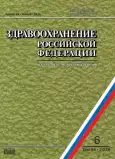Тревожные переживания медицинских работников и других групп населения, вызванные распространением COVID-19
- Авторы: Одарущенко О.И.1, Кузюкова А.А.1, Яковлев М.Ю.1, Фесюн А.Д.1, Богдан И.В.2, Петрова Г.Д.2
-
Учреждения:
- ФГБУ «Национальный медицинский исследовательский центр реабилитации и курортологии» Минздрава России
- ГБУ «Научно-исследовательский институт организации здравоохранения и медицинского менеджмента Департамента здравоохранения города Москвы»
- Выпуск: Том 64, № 6 (2020)
- Страницы: 364-367
- Раздел: МЕДИЦИНА ТРУДА
- Статья получена: 25.10.2024
- URL: https://modernonco.orscience.ru/0044-197X/article/view/637952
- DOI: https://doi.org/10.46563/0044-197X-2020-64-6-364-367
- ID: 637952
Цитировать
Полный текст
Аннотация
Пандемия COVID-19 создала угрозы и риски не только для физического, но и для психического здоровья людей. На сегодняшний день недостаточно научных данных о тревожности, депрессивных состояниях медицинских работников, непосредственно не взаимодействующих с зараженными, но работающих в условиях новой коронавирусной инфекции.
Цель исследования - изучение тревожных переживаний у медицинских работников, не взаимодействующих непосредственно с заболевшими COVID-19, и лиц, работающих в других областях (образовательная деятельность, офисный персонал), в условиях пандемии.
Материал и методы. В рамках исследования проведен онлайн-мониторинг тревожных переживаний у 55 медицинских работников, не работающих с заболевшими COVID-19, и 47 представителей других профессий в условиях пандемии коронавируса (всего 102 участника, из них 32 мужчин, 70 женщин, средний возраст испытуемых - 38,9 (24,5; 64,7) года).
Результаты. Обследование выявило более высокий уровень реактивной и личностной тревожности в группе медицинских работников (p ≤ 0,05).
Выводы. Особенно подверженными психологическому стрессу во время пандемии COVID-19 оказались медицинские работники, не взаимодействующие непосредственно с заболевшими, но работающие в условиях пандемии, что подтверждает необходимость коррекции дистрессовых опасений у этой группы населения и оказания адресной клинико-психологической помощи.
Ключевые слова
Об авторах
Ольга Ивановна Одарущенко
ФГБУ «Национальный медицинский исследовательский центр реабилитации и курортологии» Минздрава России
Автор, ответственный за переписку.
Email: olgaodar@yandex.ru
ORCID iD: 0000-0002-0416-3558
Канд. психол. наук, ст. науч. сотр. ФГБУ «Национальный медицинский исследовательский центр реабилитации и курортологии» Минздрава России, 121099, Москва.
e-mail: olgaodar@yandex.ru
РоссияА. А. Кузюкова
ФГБУ «Национальный медицинский исследовательский центр реабилитации и курортологии» Минздрава России
Email: noemail@neicon.ru
ORCID iD: 0000-0002-9275-6491
Россия
М. Ю. Яковлев
ФГБУ «Национальный медицинский исследовательский центр реабилитации и курортологии» Минздрава России
Email: noemail@neicon.ru
ORCID iD: 0000-0002-5260-8304
Россия
А. Д. Фесюн
ФГБУ «Национальный медицинский исследовательский центр реабилитации и курортологии» Минздрава России
Email: noemail@neicon.ru
ORCID iD: 0000-0003-3097-8889
Россия
И. В. Богдан
ГБУ «Научно-исследовательский институт организации здравоохранения и медицинского менеджмента Департамента здравоохранения города Москвы»
Email: noemail@neicon.ru
ORCID iD: 0000-0002-7002-1646
Россия
Г. Д. Петрова
ГБУ «Научно-исследовательский институт организации здравоохранения и медицинского менеджмента Департамента здравоохранения города Москвы»
Email: noemail@neicon.ru
ORCID iD: 0000-0001-9919-2548
Россия
Список литературы
- Yao H., Chen J.H., Xu Y.F. Patients with mental health disorders in the COVID-19 epidemic. Lancet Psychiatry. 2020; 7(4): e21. https://doi.org/10.1016/S2215-0366(20)30090-0
- Qiu J., Shen B., Zhao M., Wang Z., Xie B., Xu Y. A nationwide survey of psychological distress among Chinese people in the COVID-19 epidemic: implications and policy recommendations. Gen. Psychiatr. 2020; 33(2): e100213. https://doi.org/10.1136/gpsych-2020-100213
- ВОЗ. Психическое здоровье и COVID-19. Available at: https://www.euro.who.int/ru/health-topics/health-emergencies/coronavirus-covid-19/novel-coronavirus-2019-ncov-technical-guidance/coronavirus-disease-covid-19-outbreak-technical-guidance-europe/mental-health-and-covid-19?
- WHO. Mental health and psychosocial considerations during the COVID-19 outbreak. Available at: https://www.who.int/docs/default-source/coronaviruse/mental-health-considerations.pdf
- Информационная записка Межведомственного постоянного комитета - Работа с вопросами психического здоровья и психосоциальными аспектами вспышки COVID-19. Available at: https://interagencystandingcommittee.org/iasc-reference-group-mental-health-and-psychosocial-support-emergency-settings/interim-briefing
- Голубева Н.В., Иванов Д.В., Троицкий М.С. Панические расстройства во внутрисемейных отношениях, как последствия воздействия коронавирусной инфекции (обзор литературы). Вестник новых медицинских технологий. 2020; (2): 32-8. https://doi.org/10.24411/2075-4094-2020-16629
- Психические реакции и нарушения поведения у лиц с COVID-19 (информационное письмо, подготовленное МНИИП). Available at: https://psychiatr.ru/download/4701?view=1&name=реакции.pdf
- Medscape. Anderson Р. High Anxiety in America Over COVID-19. Available at: https://www.medscape.com/viewarticle/927711
- Lai J., Ma S., Wang Y., Cai Z., Hu J., Wei N., et al. Factors associated with mental health outcomes among health care workers exposed to coronavirus disease 2019. JAMA Netw. Open. 2020; 3(3): e203976. https://doi.org/10.1001/jamanetworkopen.2020.3976
- Падун М.А. COVID-19: риски психической травматизации среди медицинских работников. Available at: http://www.ipras.ru/cntnt/rus/institut_p/covid-19/kommentarii-eksp/m-a-padun-covid-19-riski-psihich.html
- Хусаинова Р.М., Гредюшко О.П. Особенности ситуативной и личностной тревожности в учебной и педагогической деятельности. Современные проблемы науки и образования. 2012; (5): 365.
- Леонова А.Б., Кузнецова А.С. Психологические технологии управления состоянием человека. М.: Смысл; 2009.
- Одарущенко О.И., Самсонова Г.О., Нувахова М.Б. Клинико-психологические критерии диагностики актуального эмоционального состояния пациентов с цереброваскулярной патологией в практике стационара. Вестник восстановительной медицины. 2020; (1): 19-26.
- Мосолов С.Н. Актуальные задачи психиатрической службы в связи с пандемией COVID-19. Современная терапия психических расстройств. 2020: (2). https://doi.org/10.21265/PSYPH.2020.53.59536
- Справочник по профилактике и лечению COVID-19. Первая клиническая больница. Медицинский Факультет университета Чжэцзян. Available at: https://www.ng.ru/upload/medialibrary/e4d/doc.pdf
- Рекомендации специалистов МГППУ и НИИ им. Н.В. Склифосовского пациентам, медицинским работникам и гражданам, находящимся в самоизоляции. Available at: http://pk.mgppu.ru/item/833-рекомендации-специалистов-мгппу-и-нии-им-нвсклифосовского-пациентам-медицинским-работникам-и-гражданам-находящимся-в-самоизоляции
Дополнительные файлы







